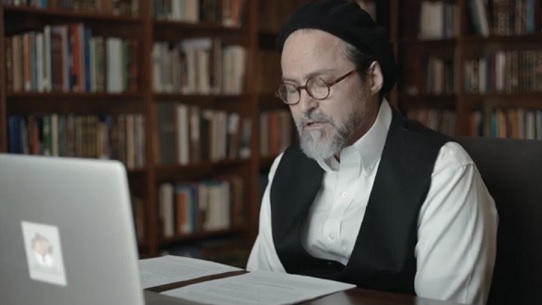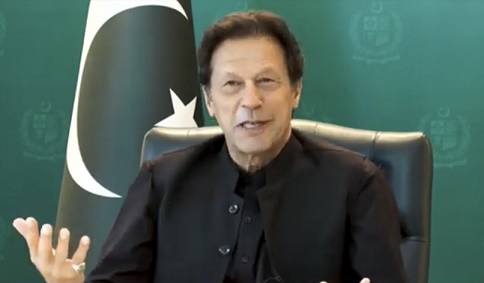PM Imran Khan in Conversation with Shaykh Hamza Yusuf
By Elaine Pasquini
Berkeley, CA: On February 4, Shaykh Hamza Yusuf, president and co-founder of Zaytuna College, a Berkeley, California Muslim liberal arts school, engaged Imran Khan, prime minister of Pakistan, in a conversation on a wide range of issues, including his Muslim faith and spiritual journey from cricket superstar to Pakistan’s 22nd prime minister.

During his almost two decades of being in the international sports arena, he experienced many ups and downs, the prime minister said. “And when you fall it leads to a lot of soul-searching. During the lower period of your life it teaches you a lot…because you know that you will not always stay up there.”
At the end of his sporting career, PM Imran related, he was “blessed with Almighty’s greatest gift and that is faith. I never understood the concept of people forcing something into your religion or faith, because for me faith is a gift of God. And once you have that then you have a completely different perspective on life because you believe that success and respect are in the hands of God. This is clearly stated in the Qur’an.”
Expressing his opinion that “…in many parts of the Arab world…many Muslims have lost the sense of civilizational pride,” Shaykh Hamza Yusuf, one of the most acclaimed Muslim scholars in the Western world, told the prime minister: “It seems to me what you are really trying to do in an extraordinary country with extraordinary people is restore that pride and sense of who we are as a people.”
Yusuf praised PM Imran for not being “ashamed” of his faith and tradition, “which is quite rare among people who have entered into politics,” he said.

“What I find, unfortunately, is basically the leaders that come up through the political system are just too divorced from the tenants of their faith,” the prime minister said. “They come in for power and then they compromise to stay in power and that power is for personal benefits. Very few politicians I find come with a specific objective of looking after humanity.”
Turning to the subject of climate change, Yusuf commended the prime minister’s reforestation project of aiming to plant one billion trees across Pakistan.
Climate change is occurring because “human beings have moved so far away from the Sacred,” the prime minister said, “which means being humane, thinking about others.” He referred to a saying by Prophet Muhammad - peace be upon him - that “you should live in this world as if you will live for a thousand years so whatever you are doing right now you should think of the repercussions it will have on humanity for another one thousand years.”
This statement, he pointed out, “completely envelops everything about the environment, about how we should be treating the way that we live on this earth.”
Responding to Yusuf’s question on how he deals with Pakistan’s many challenges and what led him into politics, the prime minister stated: “If I didn’t have a mountain of faith I would have never come into politics. I had everything – I was a sports star, had respect and enough money. For me to spend 22 years of my life struggling to become a prime minister made no sense. The only reason was that I believed that I had a responsibility to my society because I was given more than others.”
“I realized that I was so blessed that I had a responsibility to society, so I wanted to make Pakistan an Islamic welfare state based on the concept of the state of Madina by our Prophet - peace be upon him -,” he added.
The prime minister explained his view that the Pakistani state should be based on two principles, the first that it is “a welfare state and humane state which takes care of its bottom strata of society.”
Secondly, he said, the fundamental principle of a civilized society is rule of law “where you bring the powerful under the law” and have equal enforcement of the law for all citizens.
“Now the powerful have one law and the weak are judged by another law, so the jails are all filled by the poor people,” the prime minister lamented. “The rich crooks never get into jails.”
While Pakistan has tremendous potential with immensely talented people who are quite diverse, “If I look back, the reason we have not achieved our potential is the lack of rule of law,” Khan stated. “I am convinced that no society can ever achieve its potential if there is not rule of law.”
Merit is also associated with rule of law, he continued. “And if you do not have meritocracy in a society you have this elite which is spoiled, rich, which has captured the resources, which does not struggle and strive, so countries disintegrate because of a decedent elite.”
Actions that could unleash Pakistan’s great potential include lifting people out of poverty, creating wealth that can be spread around and breaking the monopoly of the elite and mafias, he said. “I feel this country I always believed in has great potential.”
“It seems to me that you have taken on an incredible challenge,” Yusuf concluded. “It’s very inspiring and I think a lot of Muslims are inspired by it. One of the most successful communities in the United States is the Pakistani community in diaspora. In fact, the college that I am running…is largely here because of Pakistani immigrants to America. The real background of our support has been from South Asians, largely from Pakistan. The Pakistani community here is a very successful community.”
(Elaine Pasquini is a freelance journalist. Her reports appear in the Washington Report on Middle East Affairs and Nuze.Ink.)

